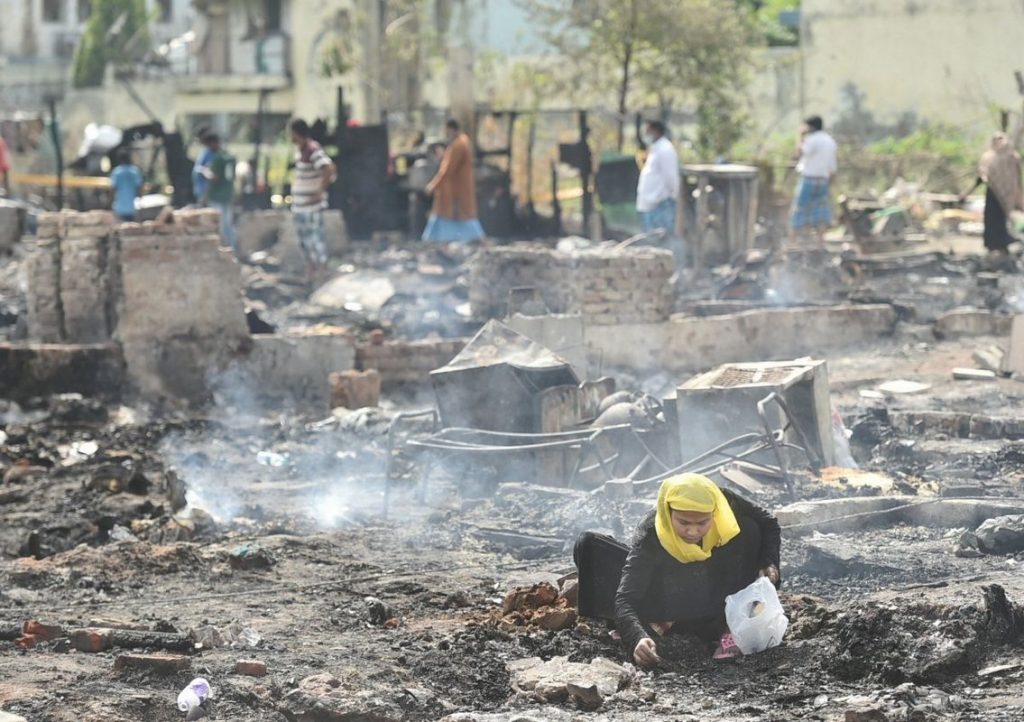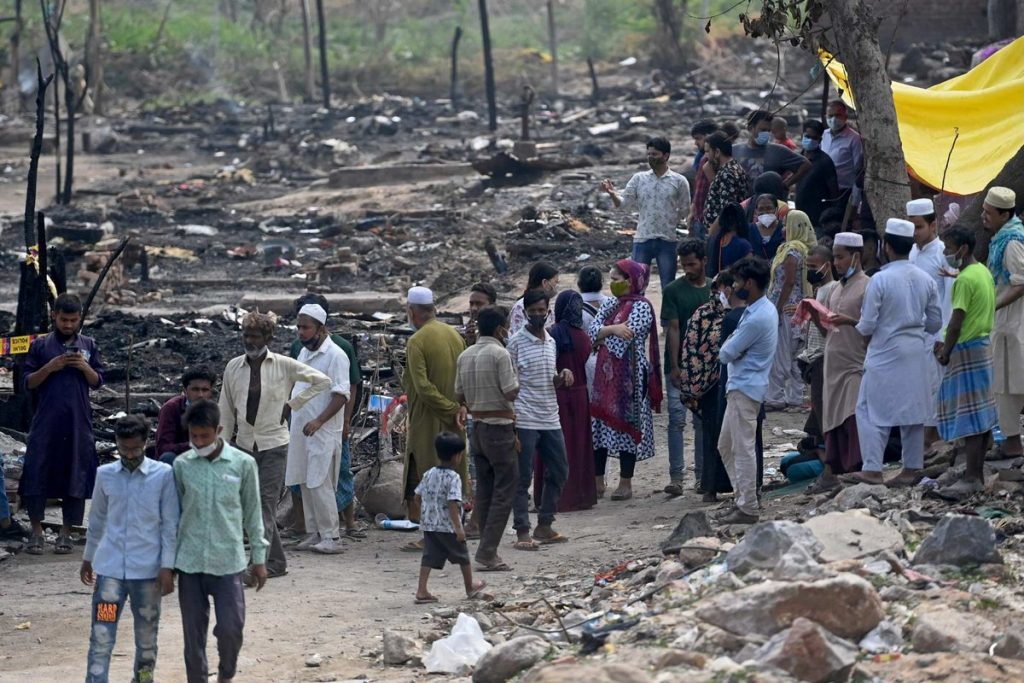Hundreds of Rohingya rendered homeless after a massive fire razes Rohingya camp in the Madanpur Khadar area of Delhi.

A massive fire has destroyed a Rohingya refugee camp in the Indian capital, New Delhi, leaving hundreds of people homeless.
The blaze broke out at about 11:30 pm on Saturday and quickly spread through the camp, reducing 55 ramshackle shelters to ashes in the Madanpur Khadar area in the capital city’s south. No deaths or serious injuries have been reported in the fire – the second time the camp has been reduced to ashes since 2018.
The fire service department of the national capital said that it put 15 fire tenders into service and brought the blaze under control in about six hours. “We rushed to the spot quickly and started dousing the flames,” Sandeep, an operator at the Delhi Fire Service, said on Sunday.
The fire tore through the camp, home to 55 families – filling the sky with plumes of smoke and flames as refugees scrambled to safety, crying for help.
More than 53 Rohingya families are homeless after a fire broke out in the Madanpur Khadar camp last night @SaketGokhale @harsh_mander they need help pic.twitter.com/xzcIXS5mL8
— Ashima Sharma (@AshimaS4) June 13, 2021
Sufia Khatoon, 32, was asleep inside her hut along with her physically challenged mother and her child when the fire broke out. It started in an abandoned hut, she said.
“When we saw the fire, I held my mother’s hand and lifted my child in my arms and ran away to safety outside the camp,” Khatoon said. “We lost everything. The fire destroyed even the little cash that we had kept for our daily needs. We don’t have a single [Indian] rupee to buy water.”
She appealed to the government and relief groups for help with food and shelter.
Undocumented refugees
Asif Mujtaba, a Delhi-based activist, said that his group was one of the first to provide relief as soon as the flames were doused.
“We shifted those who needed medical attention to nearby hospitals, and arranged water and food for the refugees,” Mujtaba said, adding that he was reaching out to officials to help set up an interim relief camp for them, in the scorching summer heat. “We are also mapping out details of the families who suffered losses in the fire,” he said.
Another volunteer, Ahmad Kamal, opened the doors of his nearby hostel and sheltered some Rohingya for the night, providing them with food and water.
“We were hungry. Some people came here in the morning and gave us bananas and milk,” said refugee Tayyab Begum, 45.
An estimated 40,000 Rohingya refugees, many believed to be undocumented, live in camps across Indian cities, including Jammu, Hyderabad, and Nuh. The United Nations refugee agency has provided some of them with refugee cards, which helps them to access some basic services and is supposed to protect them from police action.
More than 750,000 Rohingya took shelter in Bangladesh in 2017 after the Myanmar army launched a brutal crackdown on the Muslim minority, who have been persecuted by Myanmar authorities for decades. Bangladesh currently holds more than one million Rohingya in cramped and squalid camps along its border with Myanmar.
Large numbers of Rohingya have also taken refuge in neighbouring Asian countries, including India and Malaysia.
The fire comes amid an Indian government crackdown on Rohingya refugees living in the country. In March, police in Jammu city and New Delhi jailed more than 200 refugees, saying they were living in the country “illegally”.
India’s Hindu nationalist government has said it will deport the Rohingya refugees to Myanmar in contravention of the principle of non-refoulment, which forbids a country from returning refugees to a country where they would face torture. Rights groups have warned against deporting the Rohingya to Myanmar, which also experienced a military coup in February.
For now, their deportation has been blocked by the Indian Supreme Court. But 300 refugees are still imprisoned.

What caused the fire?
While police have launched an investigation into the fire, some refugees did not rule out sabotage.
“Apparently, the cause of the fire is a short circuit,” Bharat Singh, a Delhi Police investigative officer, said.
“Forensic science experts have collected samples of electric wires from the spot to ascertain the cause behind the fire.”
However, refuges say the possibility of the camp having been “deliberately torched” could not be ruled out, as men belonging to Hindu right-wing groups have previously been accused of lighting fires in the camp.
Khatoon, the refugee who escaped with her mother and child, said the hut where the fire originated had no electricity supply or cables.
Another Rohingya, Mohammad Farooq, 38, said that hours before the fire, some masked men had arrived at the camp and told the refugees to vacate the land. They brushed it off, thinking it was just another warning that they face regularly.
“We don’t know whether somebody lit the fire or it was natural but we want to tell these men, ‘What will you get by oppressing us?’” said Farooq. “We are human like you, we, too, have children like you.”
Hindutva groups, which back the ruling Bharatiya Janata Party (BJP), have been campaigning for the deportation of Rohingya refugees, saying they pose a security threat to India and that they want to take the land.
“These kinds of incidents are regularly happening and this is the third time that the camp caught fire this year. We suspect there are men behind it,” said Ali Johar, a Rohingya community activist in New Delhi.
“We often hear threats from people, including authorities, that we will bulldoze your camps.”
 Alghadeer TV Alghadeer TV
Alghadeer TV Alghadeer TV
